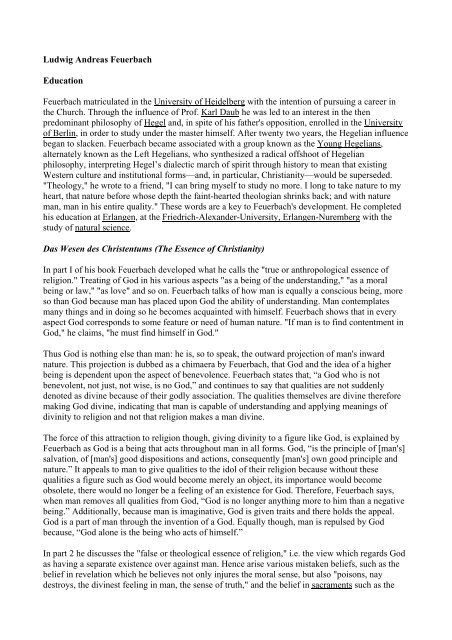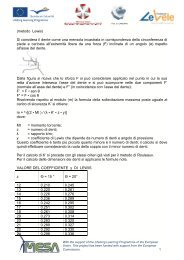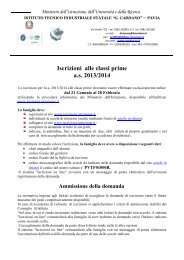Ludwig Andreas Feuerbach
Ludwig Andreas Feuerbach
Ludwig Andreas Feuerbach
Create successful ePaper yourself
Turn your PDF publications into a flip-book with our unique Google optimized e-Paper software.
<strong>Ludwig</strong> <strong>Andreas</strong> <strong>Feuerbach</strong><br />
Education<br />
<strong>Feuerbach</strong> matriculated in the University of Heidelberg with the intention of pursuing a career in<br />
the Church. Through the influence of Prof. Karl Daub he was led to an interest in the then<br />
predominant philosophy of Hegel and, in spite of his father's opposition, enrolled in the University<br />
of Berlin, in order to study under the master himself. After twenty two years, the Hegelian influence<br />
began to slacken. <strong>Feuerbach</strong> became associated with a group known as the Young Hegelians,<br />
alternately known as the Left Hegelians, who synthesized a radical offshoot of Hegelian<br />
philosophy, interpreting Hegel’s dialectic march of spirit through history to mean that existing<br />
Western culture and institutional forms—and, in particular, Christianity—would be superseded.<br />
"Theology," he wrote to a friend, "I can bring myself to study no more. I long to take nature to my<br />
heart, that nature before whose depth the faint-hearted theologian shrinks back; and with nature<br />
man, man in his entire quality." These words are a key to <strong>Feuerbach</strong>'s development. He completed<br />
his education at Erlangen, at the Friedrich-Alexander-University, Erlangen-Nuremberg with the<br />
study of natural science.<br />
Das Wesen des Christentums (The Essence of Christianity)<br />
In part I of his book <strong>Feuerbach</strong> developed what he calls the "true or anthropological essence of<br />
religion." Treating of God in his various aspects "as a being of the understanding," "as a moral<br />
being or law," "as love" and so on. <strong>Feuerbach</strong> talks of how man is equally a conscious being, more<br />
so than God because man has placed upon God the ability of understanding. Man contemplates<br />
many things and in doing so he becomes acquainted with himself. <strong>Feuerbach</strong> shows that in every<br />
aspect God corresponds to some feature or need of human nature. "If man is to find contentment in<br />
God," he claims, "he must find himself in God."<br />
Thus God is nothing else than man: he is, so to speak, the outward projection of man's inward<br />
nature. This projection is dubbed as a chimaera by <strong>Feuerbach</strong>, that God and the idea of a higher<br />
being is dependent upon the aspect of benevolence. <strong>Feuerbach</strong> states that, “a God who is not<br />
benevolent, not just, not wise, is no God,” and continues to say that qualities are not suddenly<br />
denoted as divine because of their godly association. The qualities themselves are divine therefore<br />
making God divine, indicating that man is capable of understanding and applying meanings of<br />
divinity to religion and not that religion makes a man divine.<br />
The force of this attraction to religion though, giving divinity to a figure like God, is explained by<br />
<strong>Feuerbach</strong> as God is a being that acts throughout man in all forms. God, “is the principle of [man's]<br />
salvation, of [man's] good dispositions and actions, consequently [man's] own good principle and<br />
nature.” It appeals to man to give qualities to the idol of their religion because without these<br />
qualities a figure such as God would become merely an object, its importance would become<br />
obsolete, there would no longer be a feeling of an existence for God. Therefore, <strong>Feuerbach</strong> says,<br />
when man removes all qualities from God, “God is no longer anything more to him than a negative<br />
being.” Additionally, because man is imaginative, God is given traits and there holds the appeal.<br />
God is a part of man through the invention of a God. Equally though, man is repulsed by God<br />
because, “God alone is the being who acts of himself.”<br />
In part 2 he discusses the "false or theological essence of religion," i.e. the view which regards God<br />
as having a separate existence over against man. Hence arise various mistaken beliefs, such as the<br />
belief in revelation which he believes not only injures the moral sense, but also "poisons, nay<br />
destroys, the divinest feeling in man, the sense of truth," and the belief in sacraments such as the
Lord's Supper, which is to him a piece of religious materialism of which "the necessary<br />
consequences are superstition and immorality."<br />
Part 2 comes to a crux though by seemingly retracting previous statements. <strong>Feuerbach</strong> claims that<br />
Gods only action is, “the moral and eternal salvation of man: thus man has in fact no other aim than<br />
himself,” because man's actions are placed upon God. <strong>Feuerbach</strong> also contradicts himself by<br />
claiming that man gives up his personality and places it upon God who in turn is a selfish being.<br />
This selfishness turns onto man and projects man to be wicked and corrupt, that they are, “incapable<br />
of good,” and it is only God that is good, “the Good Being.” In this way <strong>Feuerbach</strong> detracts from<br />
many of his earlier assertions while showing the alienation that takes place in man by worshipping<br />
God. <strong>Feuerbach</strong> affirms that goodness is, “personified as God,” turning God into an object because<br />
if God was anything but an object nothing would need to be personified on him. The aspect of<br />
objects having previously been discussed; in that man contemplates objects and that objects<br />
themselves give conception of what externalizes man. Therefore if God is good so then should be<br />
man because God is merely an externalization of man because God is an object. However religion<br />
would show that man is inherently corrupt. <strong>Feuerbach</strong> tries to lessen his inconsistency by asking if<br />
it was possible if, “I could perceive the beauty of a fine picture if my mind were aesthetically an<br />
absolute piece of perversion?” Through <strong>Feuerbach</strong>’s reasoning it would not be possible but it is<br />
possible and he later states that man is capable of finding beauty.<br />
The “New” Philosophy<br />
there are certain fundamental themes that occur again and again in the later <strong>Feuerbach</strong>, even though,<br />
as we shall see, commentators have differed among themselves concerning the interpretation of<br />
these themes, differences occasioned in part by <strong>Feuerbach</strong>'s own ambiguities and sometimes by his<br />
changing views. Chief among these themes are: (1) that the human organism is related to the world<br />
through its body and the senses (Sensuousness); (2) that the species-being (essence) of man is<br />
contained only in community which, however, “rests on the reality of the distinction between I and<br />
thou” (GW IX: 339; PPF 91); (3) that mind and body are just two aspects of one material organism;<br />
(4) that this organism is animated by an overwhelming drive for fulfillment (Glückseligkeitstrieb)<br />
which, in turn, manifests itself in needs and desires. Of these needs, the need for human community<br />
is fundamental as are also certain biological needs. Given these themes, the two dominant<br />
philosophical problems that emerge are (a) how to delineate the relationship between perception<br />
and thought in order to give an intelligible account of knowing and (b) how, after basing human<br />
nature on a drive to fulfillment, he can reconcile this with his ethics of altruism.<br />
Many of the themes are, of course, formulated in antithesis to idealism and, hence, an affirmation of<br />
some mode of materialism. The argument is that modern philosophy in its search for something<br />
immediately certain founded itself on self-consciousness, that is, the thinking ego. But this selfconsciousness<br />
was only a being conceived and mediated through abstraction. The new philosophy<br />
claims that “certainty and immediately are only given by the senses, perception, and feeling” (GW<br />
IX: 320; PPF 55). Only the sensuous is clear and certain. Hence, “the secret of immediate<br />
knowledge is sensuousness” (GW IX: 321; PPF 55).<br />
Whereas the old philosophy started by saying, “I am an abstract and merely a<br />
thinking being to whose essence the body does not belong,” the new philosophy, on<br />
the other hand, begins by saying, “I am a real, sensuous being and indeed, the body<br />
in its totality is my ego, my essence (Wesen) itself.” (GW IX: 320; PPF 54)
What <strong>Feuerbach</strong> ultimately proposes is a thorough examination of human nature, its needs,<br />
successes and desires. It is only then, he argues, that we will have a complete “philosophy of the<br />
future’”<br />
He expressed in an eager, disjointed, but condensed and laboured fashion, certain deep-lying<br />
convictions -- that philosophy must come back from unsubstantial metaphysics to the solid<br />
facts of human nature and natural science, that the human body was no less important than<br />
the human spirit ("Der Mensch ist was er isst", "Man is what he eats") and that Christianity<br />
was utterly out of harmony with the age. His convictions gained weight from the simplicity,<br />
uprightness and diligence of his character; but they need a more effective justifcation than he<br />
was able to give them.
econdo <strong>Feuerbach</strong> invece, è nel finito che deve essere ritrovato l'infinito , non viceversa; l'infinito<br />
stesso è pensabile soltanto attraverso il finito e la negazione del finito. L'inizio della filosofia non è<br />
dunque Dio o l'Assoluto, ma ciò che è finito, determinato e reale. La filosofia dell'avvenire, in<br />
quanto antropologia, riconoscendo il finito come infinito, deve partire, non da come aveva fatto<br />
Hegel, dal pensiero autosufficiente, inteso come soggetto capace di costruirsi con le sue proprie<br />
forze, bensì dal vero soggetto, di il cui pensiero è soltanto un predicato. Esso è l'uomo in carne e<br />
ossa, mortale dotato di sensibilità e bisogni: in questo consiste l'umanesimo di <strong>Feuerbach</strong>. Occorre<br />
dunque partire da ciò che dà valore al pensiero stesso, ossia dall'intuizione sensibile perché<br />
veramente reale è soltanto ciò che è sensibile . Solo attraverso i sensi un oggetto è dato come<br />
immediatamente certo: il sensibile infatti non ha bisogno di dimostrazione, perché costringe subito a<br />
riconoscere la sua esistenza. In questa prospettiva, la natura non si trova più ridotta a semplice<br />
forma estraniata dello spirito, come avveniva in Hegel, ma diventa la base reale della vita<br />
dell'uomo. Si apre così la possibilità di una nuova filosofia, il sensualismo , che è la risoluzione<br />
compiuta della teologia in antropologia: in essa è superata ogni scissione tra uomo e mondo, corpo e<br />
spirito.<br />
La filosofia dell’avvenire. La filosofia di <strong>Feuerbach</strong> vuole essere un completo rovesciamento della<br />
filosofia religiosa e dell’idealismo hegeliano. L’inizio della filosofia non deve più essere Dio o<br />
l’Assoluto bensì l’uomo, e l’uomo determinato, concreto. L’uomo è un essere naturale, reale,<br />
sensibile, e come tale deve essere considerato dalla filosofia che non può ridurlo ad un concetto o a<br />
puro pensiero o a sola razionalità ma deve considerarlo integralmente, "dalla testa al calcagno". La<br />
nuova filosofia, la filosofia del futuro sarà la "risoluzione completa della teologia (hegeliana) nella<br />
antropologia". La nuova filosofia di <strong>Feuerbach</strong> vuole essere un umanesimo: è l’uomo l’unico vero<br />
oggetto della filosofia, e l’uomo nella sua concretezza, nella sua corporeità, nella sua fisicità<br />
(<strong>Feuerbach</strong> giunge a dire, in modo un po’ paradossale ma che indica bene la sua esigenza di<br />
concretezza, che "l’uomo è ciò che mangia": si noti che in tedesco è un gioco di parole che suona<br />
così : Mann ist wa isst). "La vera dialettica – sostiene <strong>Feuerbach</strong> – è un dialogo tra l’io e il tu". Non<br />
ha nulla a che vedere con assoluto, essenze e simili. Se poi l’uomo è un essere sociale, allora<br />
l’amore è la passione dominante dell’uomo stesso. Dunque l’amore per l’uomo, la filantropia,<br />
dev’essere lo scopo principale della filosofia :






